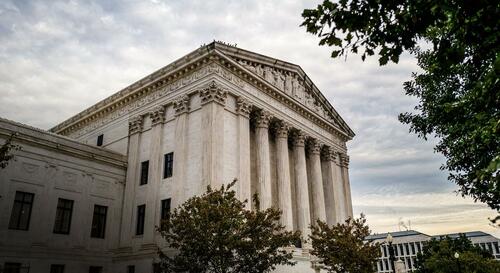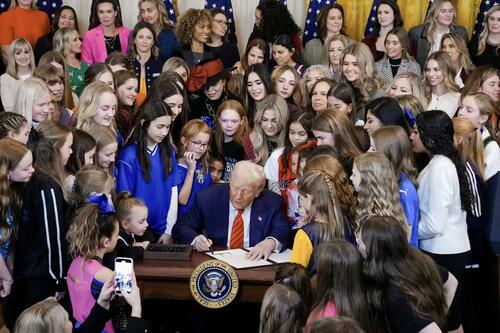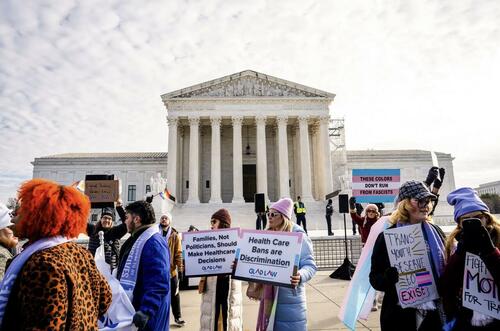Top Supreme Court Cases To Watch As Justices Reconvene
Authored by Sam Dorman and Stacy Robinson via The Epoch Times,
The Supreme Court is set to return on Oct. 6 for its 2025–2026 term, in which it will consider a series of cases that could affect major constitutional issues and impact President Donald Trump’s agenda.
The high court is expected to hear challenges to Trump’s policies and has already decided to hear arguments over Trump’s tariffs and attempts to fire high-level officials.
The Supreme Court will also consider whether states can ban men from playing in women’s sports, whether a ban on so-called conversion therapy violates free speech rights, and a variety of election-related cases that could affect the balance of political power in the United States.
Here are the top cases so far this term and what is at stake in each.
1. Trump’s Tariffs
In perhaps the most anticipated case this term, the high court will decide on the legality of a large swath of Trump’s tariffs.
Trump invoked an emergency powers law to impose reciprocal tariffs on almost all countries, as well as levies on Canada, Mexico, and China over the trafficking of fentanyl into the United States.
Several federal courts have ruled that those tariffs went beyond what the law allowed.
Under the Constitution, Congress has the power to impose tariffs, and it can delegate this authority to the president.
The Trump administration argues that the law, called the International Emergency Economic Powers Act, authorizes the president to impose tariffs through a provision that grants the president the power to regulate importation.
However, the U.S. Court of Appeals for the Federal Circuit has pointed out that that section of the law does not explicitly use the term “tariffs.”
It blocked the tariffs, but has paused the effects of its ruling until after the Supreme Court issues its judgment.
The Supreme Court has set a consolidated oral argument for Nov. 5 in Learning Resources Inc. v. Trump and Trump v. V.O.S. Selections.
A truck carrying a shipping container at Port Newark Container Terminal in Newark, N.J., on April 10, 2025. President Donald Trump invoked an emergency powers law to impose reciprocal tariffs on almost all countries. Samira Bouaou/The Epoch Times
2. Removal of High-Level Bureaucrats
Through a series of high-profile firings, Trump has led the federal court system to revisit a 90-year-old Supreme Court precedent. The 1935 decision in Humphrey’s Executor v. United States held that Congress can set limits on the president’s ability to remove certain officials.
So far, lower courts have pointed to this decision as a basis for reversing Trump’s firings. Many of the lower court decisions have reached the Supreme Court’s emergency docket in recent months.
Although the justices have weighed in on some of those cases, they have not offered a final ruling on how far Congress can go in limiting Trump’s removal power.
That is expected to change soon, as the Supreme Court recently agreed to hear a case, Trump v. Slaughter, challenging Trump’s firing of a member of the Federal Trade Commission, Rebecca Slaughter.
That agency was also the subject of the decision in Humphrey’s Executor, which the Supreme Court has said it may be open to overruling.
In 1935, the court said Congress could restrict the president’s removal of Federal Trade Commission board members because they served a “quasi-legislative” or “quasi-judicial” role.
While the exact definitions of “executive” and “quasi-legislative” power remain uncertain, those questions will likely be central to the Supreme Court’s eventual decision.
The Supreme Court also said on Oct. 1 that it would hear oral arguments in January over Trump’s attempt to fire Federal Reserve Board of Governors member Lisa Cook.
Trump sent Cook a letter on Aug. 25 stating that he was removing her “for cause,” citing “sufficient reason” to believe that she had made false statements on one or more mortgage agreements. He invoked the Federal Reserve Act, which states that the president can remove a member of the board “for cause.”
Cook has argued that Trump did not cite a legally recognized “cause” and that his interpretation of the law would “destroy the Federal Reserve’s historic independence.” She has also denied the allegation of fraud.
Federal Reserve Board of Governors member Lisa Cook attends the Federal Reserve Bank of Kansas City’s 2025 Jackson Hole Economic Symposium in Jackson Hole, Wyo., on Aug. 23, 2025. Trump invoked the Federal Reserve Act to remove Cook “for cause,” citing “sufficient reason” to believe that she had made false statements on one or more mortgage agreements. Jim Urquhart/File Photo/Reuters
3. Girls Athletics
In recent years, red states have advanced legislation to ban boys’ participation in girls’ sports. Two of those states, Idaho and West Virginia, are expected to appear before the Supreme Court this term to defend the legality of their policies on that issue.
The Supreme Court agreed to hear the cases after issuing another landmark decision in United States v. Skrmetti, which holds that states can ban hormone therapy or gender-altering surgeries for minors without violating the equal protection clause of the 14th Amendment.
The high court is expected to address that same constitutional provision in the sports cases Little v. Hecox and West Virginia v. B.P.J.
In both cases, students are arguing that the state laws discriminate based on “transgender status” and therefore violate the Constitution.
Beyond that issue, the Supreme Court is expected to look at whether West Virginia’s ban violates a federal law known as Title IX of the Civil Rights Act.
That decades-old law bans sex-based discrimination by educational institutions that receive federal funding.
An appeals court said in 2023 that West Virginia violated Title IX.
The Trump administration, in a friend-of-the-court brief, said that the state’s policies are legally sound.
The plaintiff in the Idaho case, a college senior, has reversed course and stated an intention to not participate in women’s sports. The student has suggested that the case is therefore moot, or irrelevant, before the court.
It is unclear whether that particular case will now proceed to oral argument.
The court has not yet set a date for the hearing.
President Donald Trump, joined by female athletes, signs the “No Men in Women’s Sports” executive order in the White House on Feb. 5, 2025. Andrew Harnik/Getty Images
4. Redistricting
After Louisiana redrew its congressional district map in 2022, a group of private citizens, along with civil rights groups, sued.
The map only contained one mostly-black district, even though that group of voters represents one-third of the state’s population.
The plaintiffs argued that this was done to dilute black voting power in Louisiana and that it violated the Voting Rights Act of 1964.
That legislation prohibits laws or policies that “deny or abridge the right of any citizen of the United States to vote on account of race or color.”
The groups won in district court.
The judge ordered the state to draw the lines again and add another mostly-black district. Louisiana did so in 2024.
A group of non-black voters then sued, arguing that the redrawing based on race discriminated against non-minority voters.
The Supreme Court heard arguments in the case in March but declined to issue a ruling.
Instead, the court wanted more briefs and arguments from both sides about whether creating a second mostly-minority district violated the equal protection clause of the 14th Amendment or the 15th Amendment.
The 15th Amendment prohibits voter discrimination based on “race, color, or previous condition of servitude.”
The outcome may have implications for the 2026 midterm elections. Republicans currently hold a slim majority in the House of Representatives, and Democrats are looking to retake that chamber.
In 2022, Republicans won five out of Louisiana’s six congressional seats.
In 2024, after the new map was introduced, the GOP won four of those seats and Democrats won two.
That case will be argued again on Oct. 15.
Customers eat as they watch the election results at the Louisiana Pizza Kitchen in New Orleans on Nov. 5, 2024. In 2024, after the new Louisiana congressional district map was introduced, the GOP won four of the state’s six congressional seats, one fewer than in 2022. Sandy Huffaker/AFP via Getty Images
5. Pregnancy Center’s Donor Lists
First Choice Women’s Resource Centers provides free counseling to parents experiencing unplanned pregnancies but does not perform abortions or give abortion referrals.
In late 2023, New Jersey Attorney General Matt Platkin accused the pregnancy center of violating the state’s Consumer Fraud Act by hiding its pro-life stance from clients but openly promoting it to its donor base.
He also accused the group of “misinformation” because it claimed to be able to reverse chemical abortions in certain circumstances.
Platkin subpoenaed First Choice’s donor records, but the organization resisted.
Donors have a right to anonymity, it stated, and should be protected from political retaliation.
First Choice filed suit to block the subpoena, alleging that New Jersey was violating its First Amendment rights, since the investigation was politically motivated.
It also argued that the subpoena violated its Fourth Amendment rights against unreasonable search and seizure.
What followed was a complex series of court battles, which reached the Supreme Court in May 2024.
The court then declined to halt the subpoena.
The case continued in the lower courts, and in June, the high court revisited the matter and agreed to hear arguments this fall.
6. ‘Conversion Therapy’ Ban
Colorado instituted a ban on LGBT “conversion therapy” for minors in 2019.
The law prohibits licensed therapists from attempting to “change an individual’s sexual orientation, including efforts to change behaviors or gender expressions or to eliminate or reduce sexual or romantic attraction or feelings toward individuals of the same sex.”
Colorado therapist Kaley Chiles, who works with youth seeking to deal with unwanted same-sex attraction or gender dysphoria, pushed back with a federal lawsuit against the state in 2022.
Protesters gather in front of the Supreme Court as the court hears a case over banning gender procedures for minors, in Washington on Dec. 4, 2024. Madalina Vasiliu/The Epoch Times
The suit alleges that the law is a clear violation of Chiles’s First Amendment free speech rights.
District Judge Charlotte Sweeney of the U.S. District Court for the District of Colorado denied Chiles’s request to overturn the law in December that year.
Sweeney wrote that the law does not directly regulate Chiles’s speech; rather, it regulates her conduct as a state-licensed therapist.
Any infringement on her speech rights is “incidental,” according to the judge.
An appeals court later upheld that decision.
Colorado is one of 27 states, along with the District of Columbia and Puerto Rico, that have restricted or banned conversion therapy for minors.
If the Supreme Court sides with Chiles, it may trigger suits against those laws.
Oral arguments are set for Oct. 7.
7. Hawaii’s Gun Restrictions
The court will take up a major gun case this term, considering the constitutionality of a Hawaii law that bans firearms on private property, unless the property owner has consented.
The case cites the 2022 Supreme Court decision in New York State Rifle & Pistol Association v. Bruen, which states that firearm restrictions need to be consistent with the nation’s “history and tradition.”
Hawaii’s law states that if concealed carry permit holders want to take guns onto private property, including stores, restaurants, and hotels, they need permission, either verbally or through a sign.
The U.S. Court of Appeals for the Ninth Circuit upheld the restrictions in 2024. A group of Hawaiians, along with the Hawaii Firearms Coalition, told the Supreme Court that the Ninth Circuit’s decision analyzed U.S. history, specifically previous laws, in the wrong way.
The Trump administration similarly argued that the law fell foul of the 2022 ruling.
“Because most property owners do not post signs either allowing or forbidding guns, Hawaii’s default rule functions as a near-complete ban on public carry,” Solicitor General D. John Sauer wrote in a court filing.
Hawaii has responded by defending the Ninth Circuit’s ruling, arguing that the Second Amendment does not override a property owner’s right.
“The rule can be upheld for the independent reason that it represents a valid governmental effort to vindicate property owners’ fundamental right to exclude by enacting a default rule that comports with the community’s reasonable expectations,” a brief from the state reads.
The case, Wolford v. Lopez, has not yet been scheduled for oral argument.
8. Death Penalty and IQ
In November 1997, Joseph Clifton Smith and an accomplice murdered Durk Van Dam in Mobile County, Alabama, bludgeoning him to death for $140, his shoes, and some tools.
Smith was convicted, and a jury decided that he should be executed.
But in 2002, the Supreme Court ruled in another case that mentally disabled convicts could not be executed because their mental capabilities reduce their culpability and ability to assist lawyers in trial.
Following that ruling, Smith appealed his case.
He had taken multiple IQ tests with scores ranging from 72 to 78.
In Alabama, the threshold for intellectual disability is an IQ score of less than 70.
However, since Smith’s lowest test had an error range of plus or minus three points, a psychiatrist testified that his IQ could be as low as 69, which would put him in the range to avoid execution.
Alabama’s lethal injection chamber at Holman Correctional Facility in Atmore, Ala., on Oct. 7, 2002. Dave Martin/AP Photo
A district judge and an appeals court agreed with this reasoning, ruling that Smith could not be executed.
Alabama challenged those rulings, arguing that the courts should have taken the full range of IQ scores into account instead of the error margin of the lowest score.
Arguments were originally set for November, but were removed from the calendar in mid-September.
The court has not yet rescheduled.
9. Campaign Spending
The controversy over money in politics is returning to the Supreme Court this term in a case regarding to what extent political parties and candidates can coordinate their spending.
Decades ago, Congress passed a law called the Federal Election Campaign Act, which imposes limits on this type of spending.
Coordinated expenditures include such activities as making payments for political consultants, renting venues for rallies, and spending money on political advertising.
In 2022, then-Senate candidate JD Vance, then-Rep. Steve Chabot (R-Ohio), and two Republican committees brought a lawsuit questioning whether those limits violated the First Amendment.
When an appeals court reviewed the case in 2024, it was sympathetic to the Republicans’ arguments but said its hands were tied because of a previous Supreme Court decision that backed the idea that Congress could regulate coordinated expenditures without violating the First Amendment.
Republicans argue that the 2001 decision in Federal Election Commission v. Colorado Republican Federal Campaign Committee left some room for challenges based on the First Amendment.
They also contend that the government lacked a legitimate basis for imposing the limits.
Audience members watch the CNBC Republican Presidential Debate at the University of Colorado’s Events Center in Boulder, Colo., on Oct. 28, 2015. The Federal Election Campaign Act, which imposes limits on coordinated expenditures by political parties and candidates, was challenged in 2022 by a lawsuit questioning whether those limits violated the First Amendment. Justin Sullivan/Getty Images
The Federal Election Commission, which the Republicans are suing, has similarly criticized the law, so the Supreme Court has appointed another attorney to defend the lower court decision.
Oral arguments in the case, National Republican Senatorial Committee v. Federal Election Commission, have not yet been set.
10. Defense Contractor Liability
On Nov. 3, the Supreme Court is expected to consider whether defense contractors can be sued for liability over terrorist attacks in foreign countries. The case is Hencely v. Fluor Corp.
An Afghanistan veteran named Winston Hencely was critically injured in a 2016 suicide bombing. The terrorist attack occurred on a U.S. military base and was committed by the Afghan employee of a contractor who worked on the base.
An Army investigation found that the contractor, Fluor Corp., failed to properly supervise the bomber.
Hencely lost on the appeals level because of the court’s interpretation of the Federal Tort Claims Act, which generally shields the government from liability under certain circumstances.
One of those circumstances applies to the U.S. military during times of war.
Although Fluor Corp. was a contractor, the U.S. Court of Appeals for the Fourth Circuit held that the law’s protection for the federal government should be extended to companies such as Fluor.
U.S. Army soldiers retrieve their duffel bags after they return home from a nine-month deployment to Afghanistan at Fort Drum, N.Y., on Dec. 10, 2020. The Supreme Court is expected to consider whether defense contractors can be sued for liability over terrorist attacks in foreign countries. John Moore/Getty Images
11. Other Trump Cases
Besides the cases on Trump’s tariffs and his firing of officials, the Supreme Court may decide to weigh in on other challenges to the administration’s policies as they move up through the court system.
Many of the disputes have already reached the high court on its emergency docket, which lets the court temporarily allow or block executive actions while the case works its way through the lower courts.
As it has approached the 2025–2026 term, the Supreme Court has sent many cases back to lower courts, often allowing Trump to proceed with a particular action or policy.
For instance, it has allowed the Pentagon’s policy banning military troops with gender dysphoria, the administration’s withholding of billions of dollars in foreign aid, and deportations to third countries.
Several other cases are pending, including those challenging Trump’s plan to restrict birthright citizenship.
The Supreme Court ruled last term on procedural aspects of blocks to that policy but has yet to address underlying constitutional issues.
That could change, as the Trump administration asked the court on Sept. 26 to address whether Trump’s executive order seeking to restrict birthright citizenship is unconstitutional.
Combined, these cases present questions about the scope of executive authority and the nation’s separation of powers.
Tyler Durden
Mon, 10/06/2025 – 09:20ZeroHedge NewsRead More













 R1
R1
 T1
T1


